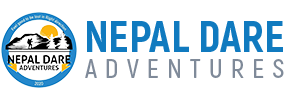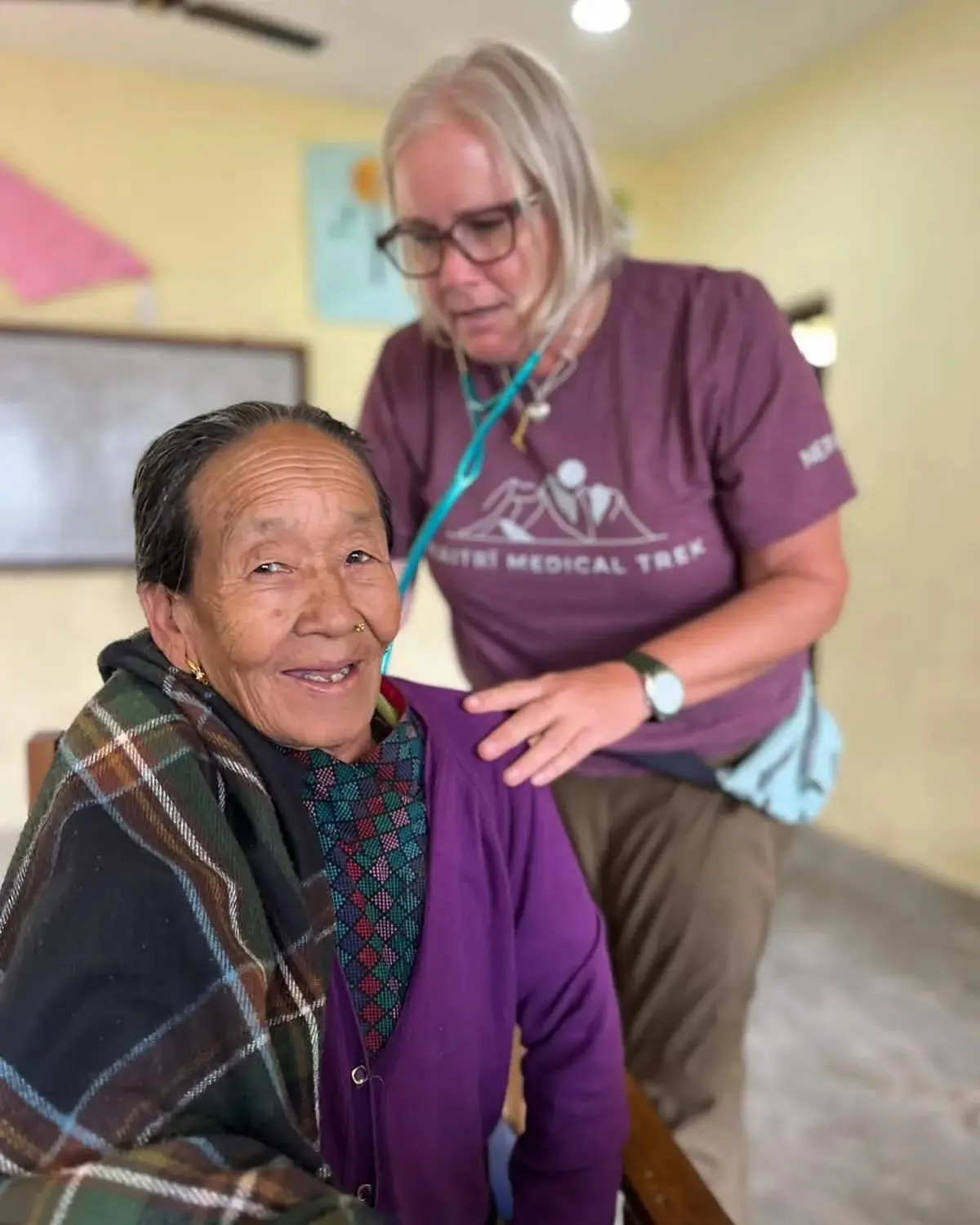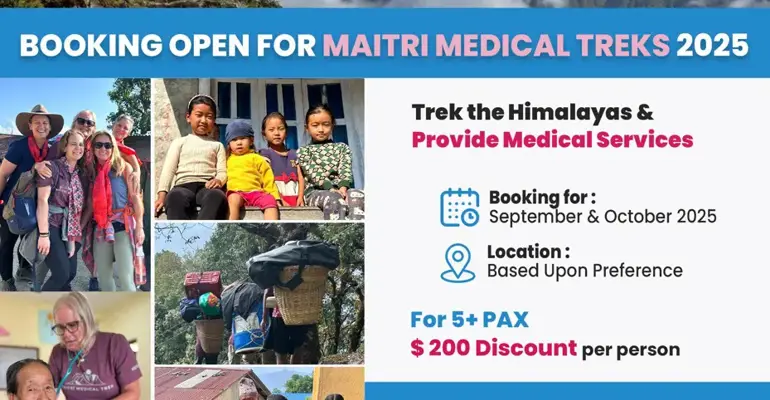
Volunteer Work Meets Trekking: A Healthcare Worker’s Guide to Nepal
Combine your medical expertise with your love for adventure by joining a meaningful volunteer program that takes you deep into Nepal’s Himalayas. If you're a healthcare professional or student looking for more than a typical tourist experience, this guide is your starting point.
Why Nepal Needs Medical Volunteers
Nepal is a country of breathtaking landscapes, rich traditions, and warm-hearted communities—but also one where rural access to healthcare remains limited. In districts like Gorkha, Dolakha, and Rasuwa, many villages are accessible only on foot. Basic healthcare facilities are either absent or severely under-resourced.
These gaps create an urgent need for mobile medical camps, particularly after monsoon season or in the colder months, when health risks increase. That’s where you come in—not just as a tourist, but as someone who makes a genuine impact.
What Is the Maitri Medical Trek?
The Maitri Medical Trek is a 14-day not-for-profit expedition that combines volunteering and trekking. Organized by Nepal Dare Adventures, it takes you through remote mountain communities where you’ll provide free medical care to underserved populations—all while trekking scenic trails off the beaten path.
Highlights Include:
Setting up 4–5 mobile health camps across mountain villages
Treating hundreds of patients—ranging from the elderly to schoolchildren
Collaborating with Nepali medical professionals, interpreters, and guides
Trekking between villages carrying only what you need, with the rest handled by porters
Immersing yourself in local customs, staying in tents or simple homestays
This isn’t medical tourism—it’s volunteer work that matters, powered by your medical knowledge and adventurous spirit.
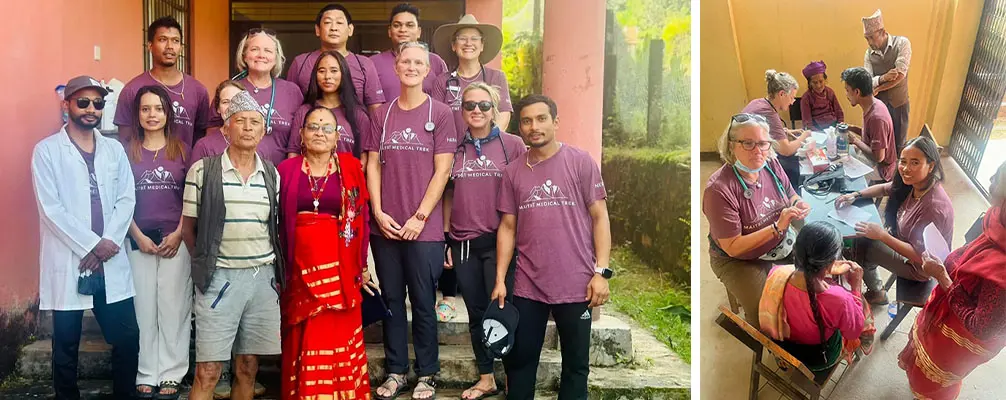
Who Should Join?
The Maitri Medical Trek is ideal for:
Doctors & Nurses: General practitioners, nurses, and specialists
Dentists & Pharmacists: Offer dental checkups and basic pharmaceutical counseling
Paramedics: Provide urgent first aid and community health training
Medical Students: Learn through supervised practice
Health Enthusiasts & Logistics Volunteers: Support medical teams, translate, assist with documentation or trek coordination
No previous experience in international aid work is necessary. You’ll be briefed, trained, and supported every step of the way.
Sample Itinerary Breakdown (14 Days)
| Day | Activity |
|---|---|
| 1–2 | Arrival in Kathmandu, orientation, and supply prep |
| 3–4 | Trek to first village in Gorkha; setup of Camp 1 |
| 5–7 | Trek across two villages (Depends Upon region); Camps 2 & 3 |
| 8–10 | Medical work, cultural immersion, Camp 4 |
| 11–12 | Final camp + village trek |
| 13–14 | Return to Kathmandu, debriefing, cultural dinner |
Each day includes morning setup, health consultations, trekking, and nightly briefings with your team.
What You’ll Need to Prepare
Medical Supplies & Equipment:
Stethoscope, BP monitor, thermometer
Personal first aid kit
Prescription pads or software if allowed
Trekking Gear:
Hiking boots
Lightweight backpack
Sleeping bag (provided, but bring liner)
Layered clothing for 5–25°C weather
Other Essentials:
Sunscreen, sunglasses, reusable water bottle
Power bank, headlamp
Lightweight rain jacket
Respectful attire for villages
Note: Organizers provide tents, sleeping arrangements, all meals, and porters for heavy gear.
More Than Medicine: The Cultural Exchange
What sets the Maitri Medical Trek apart is the human connection.
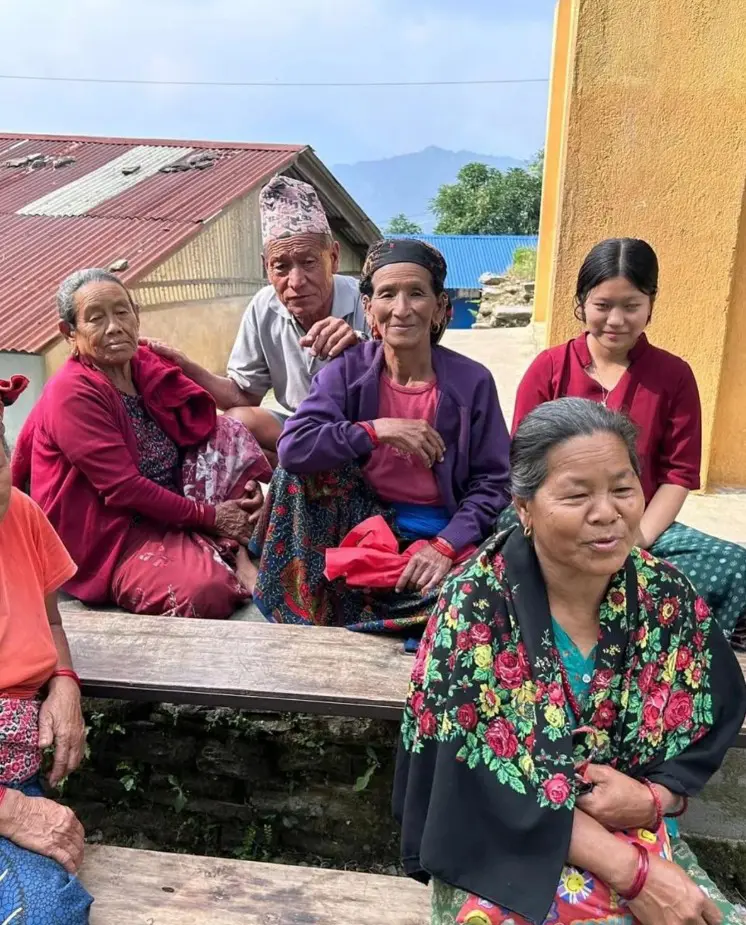
You won’t just diagnose patients—you’ll share tea with them, sit inside stone homes, and be invited to cultural rituals. You’ll learn how herbal medicine is practiced locally, and you’ll see how healthcare is interwoven with tradition, community, and resilience.
You’ll also work closely with Nepali healthcare workers, giving you a real glimpse into what sustainable rural care looks like. It’s an eye-opening, humbling experience that stays with you long after you return home.
💬 Testimonials from Past Participants
🗨️ “I’ve done hospital volunteering back home, but nothing compares to this. The villagers’ gratitude, the team spirit, and the hiking views—I felt both useful and inspired every single day.”
— Emily L., Medical Student, UK
🗨️ “It reminded me why I got into medicine in the first place. I’d do it again in a heartbeat.”
— Dr. Paul G., Family Physician, Australia
Giving Back That Lasts
100% of the trek’s profits go back to the villages you visit. The funds help buy:
School supplies like books, stationery, and backpacks
Winter clothes for children
Sanitation kits for local health centers
This isn’t just a short-term medical mission—it’s a sustainable partnership between travelers and communities.
❓ FAQs
Do I need to speak Nepali?
No, translators and interpreters are part of the trek team.
Is this safe for solo female travelers?
Yes, many solo female volunteers have joined. The trek is fully supported with trained local staff and group arrangements.
Can I get academic credit or internship hours?
Yes, many universities approve this as an elective or internship—check with your institution.
Is this suitable for first-time trekkers?
Yes, as long as you have average fitness. The trek is not technical, but you’ll walk several hours a day.
Final Thoughts: Trek With Purpose
The Maitri Medical Trek is more than a journey—it’s a mission that challenges you physically, rewards you emotionally, and reminds you why healthcare is a global calling.
So if you’re looking for a trip that combines meaning, medicine, and mountain magic, Nepal is calling.
